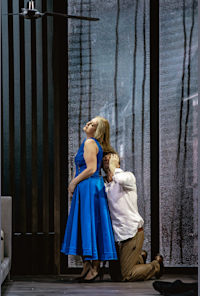The operatic premiere of the 2021/2022 season is The Dead City by Erich Wolfgang Korngold, a work that has not yet been staged on Russian stages. The chief conductor, the theater's musical director, Valentin Uryupin, chose her for his first production at the Novaya Opera. Stage Director - Vasily Barkhatov , one of the most successful theater directors.
"Dead City" E.V. Korngold (1920) - "late romantic swan song", symbolist and expressionist drama. This is a fundamental score, a landmark work of the post-romanticism era, which was a great success during the composer's life: the opera was staged in Berlin, Vienna, and New York. Unfortunately, political events in Europe drowned out only Korngold's flaring talent. He fled to the United States and became known there as a pioneer of film composing. As a result, the name of Korngold was rediscovered in Europe only decades later, and in Russia the "Dead City" was never heard. Korngold's path in Russia begins with the New Opera.
History
During the twentieth century, the attitude to the creative heritage of the Austrian and American composer Erich Wolfgang Korngold (1897-1957) changed rapidly, passing through the stages of enthusiastic recognition, oblivion and new discovery. The composer's father, the famous music critic Julius Korngold, exerted great influence and even pressure on him, deliberately creating the image of a prodigy son. When Korngold was 9 years old, gustav Mahler heard his work, he predicted a bright future for the young composer and advised him to continue his education with Alexander von Zemlinsky. At the age of 11, Korngold wrote the ballet The Snowman, which was staged at the Vienna Opera, at 14 – the first orchestral composition, and at 17 – two operas. The critic Julius Korngold was known as an ardent opponent of the new musical trends that were actively developing at the beginning of the century, perhaps that is why his son's work became a "swan song".
The political situation forced the composer to leave Austria and go to the United States. From director Max Reinhardt, he received an invitation to Hollywood to work on the music for the film A Midsummer Night's Dream. Thanks to this, Korngold's work reached a new stage: he became a famous film composer, in fact, he laid the foundations of Hollywood musical aesthetics. The composer twice received the Academy Award for Best Music for the films "Anthony the Miserable" and "The Adventures of Robin Hood". After the war, Korngold returned to academic genres, but the post-romantic style no longer fit into the aesthetics of new music. His work was forgotten, and the revival of interest in him began only at the end of the XX century.
The opera "Dead City" was written by E.V. Korngold in 1920 – at the age of 23! It is based on the play "Mirage", which, in turn, was created based on the novel of the Belgian symbolist Georges Rodenbach "Dead Bruges". The authors of the libretto were Julius and Erich Wolfgang Korngold under the pseudonym Paul Schott.
"Dead City" is a fundamental score, an iconic work of the post-romantic era, which during the composer's lifetime was a great success. The first screening is a double premiere: in Hamburg and Cologne on the same day. Then the opera was staged in many theaters, including the Metropolitan Opera, but was soon banned and after the Second World War was in obscurity. At the end of the XX - the beginning of the XXI century, the theatrical fate of the opera changed. Among the events of recent years are productions at the La Fenice Theater (Venice, 2009), the Finnish National Opera (Helsinki, 2010), the Bavarian Opera (Munich, 2019). It is noteworthy that the last two performances emphasize the cinematography of music: the directors create concepts, referring to the films "Solaris" by A. Tarkovsky (director of the play - Kasper Holten) and "Dizziness" by A. Hitchcock (director of the performance - Simon Stone), exploring the theme of illusory and multiple reality.
At the Novaya Opera
"Dead City" is staged by the recognized and formed over many years creative tandem of Vasily Barkhatov (director) and Zinovy Margolin (production designer). Together they have already created dozens of performances, many of which have been awarded prestigious theater awards. Thus, Zinovy Margolin is a four-time winner of the Golden Mask Award. Vasily Barkhatov was repeatedly nominated for the Golden Mask, and in 2019 was nominated for the International Opera Awards as the best opera director.
Musical director and conductor – Valentin Uryupin. In 2021, the maestro became the chief conductor of the theater and set a course for the discovery of new, unknown or forgotten works.
According to many researchers, the key to the success of the production of "Dead City" is a duet of a tenor and a soprano. The Novaya Opera will star in Rolf Romey (Switzerland), a world-class soloist performing leading tenor roles in the theaters of Stuttgart, Darmstadt, Berlin, Munich, Madrid, Basel and many others.
The performance at the Novaya Opera is an unusual solution from a staging and technical point of view. The action will take place in a pavilion built on an orchestra pit. And the orchestra will be located behind a pavilion at the back of the stage. For sound balance, special reflective panels will be placed above the orchestra, allowing to balance the sound of the orchestra and soloists without the use of electroacoustic amplification. Soloists will be as close as possible to the audience in order to strengthen emotional contact with the audience; for them, this performance is a kind of challenge and an unusual way of acting existence. The conductor and the soloists will interact with the help of cameras and monitors. Thus, modern technical capabilities help to create a spatial solution to the performance, embodying its concept.



